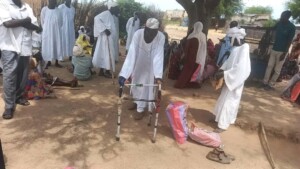Unidentified fever strikes Port Sudan
25 patients with an as yet unidentified fever were transferred from the Red Sea state area of Hoshiri to the Port Sudan Teaching Hospital in Red between Friday and Sunday.
 Patients in a hospital in Sudan (Social media)
Patients in a hospital in Sudan (Social media)
25 patients with an as yet unidentified fever were transferred from the Red Sea state area of Hoshiri to the Port Sudan Teaching Hospital between Friday and Sunday.
Journalist Osman Hashim told Dabanga Radio that the symptoms of the disease are similar to that of malaria, including pain in the back and diarrhoea.
He said that all cases are currently being treated in the hospital. Doctors are waiting on the results of blood tests.
Haemorrhagic, Rift Valley fever
Last month, the El Tugud Hospital in Port Sudan recorded five new cases of haemorrhagic fever* coming from El Ganeb locality.
The El Tagadom Rural Hospital in Port Sudan, capital of Red Sea state, received 16 cases of Rift Valley fever in mid-November.
All cases came from the area of Adawi in El Ganeb locality. They were transferred to Port Sudan because there are no health centres able to treat them in the locality.
Sudan has been facing various disease outbreaks in the past months, including cholera, dengue fever, Rift Valley fever (RVF), chikungunya, and malaria, the UN Office for the Coordination of Humanitarian Affairs (OCHA) reported in its latest Sudan Situation Report on Thursday.

* Haemorrhagic fevers are severe acute viral infections, usually with a sudden onset of fever, malaise, headache, and myalgia followed by pharyngitis, vomiting, diarrhoea, skin rash, and haemorrhagic manifestations. The outcome is fatal in more than 50 per cent of the cases, the World Health Organisation reports.
Among the fevers recently recorded in Sudan are dengue fever and Rift Valley fever (RVF). Viruses that cause dengue fever are transmitted by mosquitoes. RVF can be acquired either by a mosquito bite or by direct contact with blood or tissues of infected animals (mainly sheep), including consumption of unpasteurised milk.
Radio Dabanga’s editorial independence means that we can continue to provide factual updates about political developments to Sudanese and international actors, educate people about how to avoid outbreaks of infectious diseases, and provide a window to the world for those in all corners of Sudan. Support Radio Dabanga for as little as €2.50, the equivalent of a cup of coffee.












 and then
and then